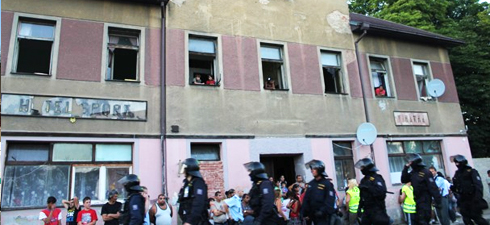In a ground-floor room of the T.G. Masaryk hostel in Varnsdorf about thirty children huddle on the double-decker bunks. Ondřej, from the nonprofit organisation Hatred is Not a Solution, hands out week-old newspapers full of photos. The photos show the demonstration last week, when local townspeople came out to the streets to mix with a crowd of dozens of skinheads.
“Now we’ll talk about what’s in those pictures,” Andrej encourages the children. “It's a demonstration against us,” says a girl of about ten. “And what do you think about it?” asks Andrej. “They're fools,” says a nine-year boy.
Outside, about fifty riot police are getting ready. “I'm here for the fourth time, and I think it’ll be repeated next week,” says one of them. The police are here to prevent a crowd from getting past the walls of the hostel.
Varnsdorf is now seeing a demonstration against the local Roma people every weekend. This time it has been called by Lukas Kohout, who made headlines after travelling round the world pretending to be an assistant to a former Czech foreign minister. In the morning a debate was held in a local cinema between representatives of the town hall and angry local residents who had been at the last demonstration. In the foyer of the cinema two men who had taken part in the last demonstration called out: “We’ve had the Gypsies up to here. We’ll meet them in the square at two and give it to them.”
Miroslav Brož, a spokesman for the initiative Hatred is Not a Solution, accompanied HN reporters to the three-story hostel building. It’s home to people who do not have the money to rent flats, where most of the residents of Varnsdorf live. For each adult the city gets three thousand crowns per month, and per child two thousand.
“It's not easy to live with them in one place"
“Today we are here to reassure people in the hostel, to keep the kids entertained so they don’t go outside, where something might happen to them,” Brož explains. “The town hall does pay social workers, but they’re not here today,” he sighs.
From out of the rooms peer children and adults. “Lady, when will it end? We want out,” says an angry old woman. She is not a Roma, but she was taken in by the hostel because she was unable to pay normal rent.
“Sure, I understand that people are angry because Gypsies steal and make a mess. And sometimes they kill someone. But they’re not all like that; every coin has two sides,” she explains. “I had a job, a family and a flat, and now I don’t,” she says, explaining why she lives here. Why she lost it all, though, she doesn’t say.
“I’m not surprised that the people of Varnsdorf have issues with the local Roma community,” says a local policeman from the anti-conflict team, describing Varnsdorf’s problem. “It's not easy to live with them in one place. More and more are moving here, thanks to hostels that entrepreneurs started to set up in a big way.”
A number of local entrepreneurs have started up businesses based on the relocation of social cases. Thanks to the contributions to social housing paid out by the state, they profit, as does the town, which also owns some hostels. The payments are per head, which tends to lead to crowding.
"We're not just a band of lying thieves"
At the T.G. Masaryk, as the hostel is called, live about a hundred socially disadvantaged people. Most of them are furious that on a sunny Saturday they have to sit indoors, simply not to provoke a conflict.
But a few are scared, too. That was why they did not go to the cinema in the morning to talk over the situation with the rest of the town. “Next time we will have to go and talk about it with those folks. We're not just a band of lying thieves,” swears a man named Vyskočil and pushes František Godl up to the camera.
“Franta here took a retraining course on basic computer operations. No one took him on. He tried to get on as a field social worker, but failed there too. So here he rots,” Vyskočil shouts in anger.
After almost three hours the crowd gave up, after the police refused to let them get to the residents of the hostel, and they went their own ways. “Now the children want to go outside. They’ve been shut in all day and should go get a bit of fresh air,” says Kumar Vishwanathan*, a social worker from India with a great deal of experience with the Roma community in the Ostrava region.
Translated from the Czech by Anton Baer
*For his work in the association “Let’s Live Together” Kumar Vishwanathan was awarded the František Kriegel Award by the Charta 77 Foundation and the Alice G. Masaryk Human Rights Award from the U.S. Embassy for his work on better relations between the Roma and non-Roma Czechs.
Was this article useful? If so we are delighted!
It is freely available because we believe that the right to free and independent information is essential for democracy. But this right is not guaranteed forever, and independence comes at a cost. We need your support in order to continue publishing independent, multilingual news for all Europeans.
Discover our subscription offers and their exclusive benefits and become a member of our community now!












